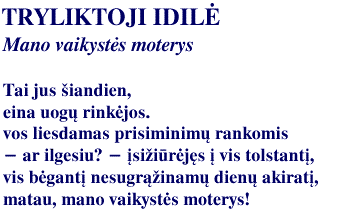THIRTEENTH IDYLL
The Women of My Childhood
Even today,
now the hands of memory -- or, maybe, longing --
just barely reach where I keep looking
back on days fading away beyond return from the
 horizon,
horizon,
I still see you, the women of my childhood.
Aunt Maria, the one used to come and help
pull beets and dig potatoes. Matsys' young bride,
the autumn he carried her off in the rain through the
 bushes,
bushes,
the open wagon full of men singing;
all through the summer her kerchief used to bob
white and small out of the thickets,
above the clayey, graying garden plots.
The Marchius sisters, all summer on the go
lugging milk up from pasture -- and berries,
full buckets back from the woods;
the two of them, later on, in heavy wool stockings,
stout and reddened, bending their backs in the flax fields.
Songs I used to hear each fall were theirs,
high-voiced and sad, as they dragged through rain and wind
to pull up beets and potatoes; or staggered,
shaking out pitchforks of manure.
They were the ones I saw around the yard each spring,
while I was a child there: raking the orchard,
or digging away, prodding around in the flower garden,
planting the black bulbs for dahlias.
Out early Pentecost Sunday, my sister would sprinkle sand
fresh from the sandpit, in yellow handfuls along the flower paths.
She'd swept the rooms by then, made a quick run to the orchard
and brought back plum blossoms,
or sky-blue lilacs for the dining table;
then, tying her Sunday kerchief under the chin
she'd run out front again, where the horse stood rigged;
already up in the wagon -- with flowers carved in the seat --
her brothers sat waiting.
Women I used to see back in those early years
and follow through winter, my face to the window,
as they shuffled by on icy walks; watch the bright flock of them
go laughing, chattering down the fieldpath,
past me and the grazing cattle,
then out along the ditch, into the rye.
Or standing by the cemetery gate,
once the wagon went past, with the dead in it,
I'd see women from all the far-flung households
trail by at a slow pace, singing
hymns in their high voices.
And when a hard rain wrecked the crop,
or storm set fire to a house,
I'd hear them grieving like cranes.
Back then, I'd follow them and hear the whirr of their
 spinning
spinning
all through the fall; and on long winter evenings
I'd see each one lean over the same way,
wet her finger, then press her foot down
to keep the wheel turning and turning,
and each head nodding over the wheel
shone by lamplight, each in her own woman's dreams,
while I, the years I was a child there,
curled up in mother's bed
to watch, would hear
a cold hard snow sprinkle the window,
the window frame shiver.
So, even now, I see you
women of my childhood,
back where days fade, way beyond return, from the
 horizon.
horizon.

